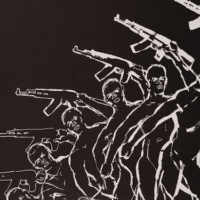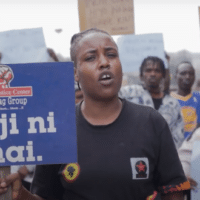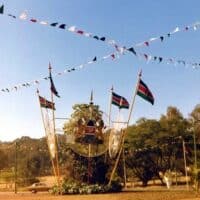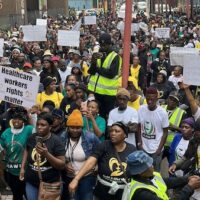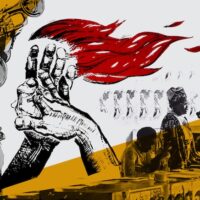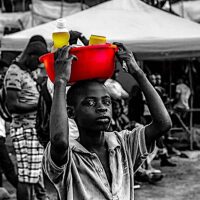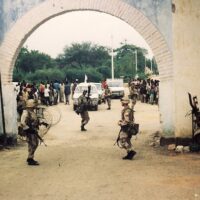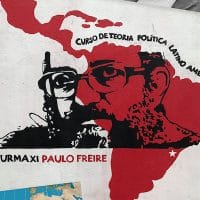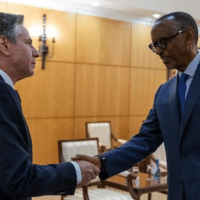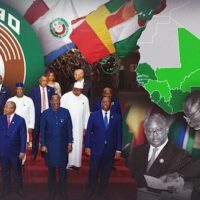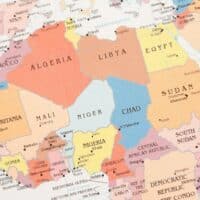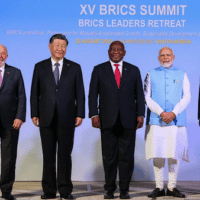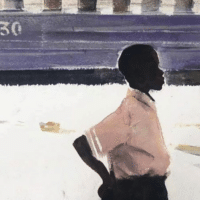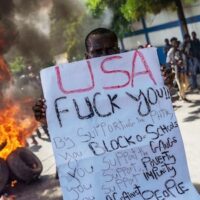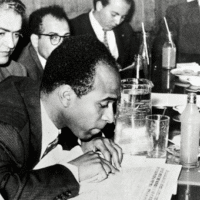-
We fight with our eyes. We plant seeds with our hands. We will watch the wheat fill the valley: The Fiftieth Newsletter (2023)
Culture is a vital centre of struggle. It is where people see who they are, learn what they are capable of, and dare to imagine what they would like to build in this world. Art itself does not change the world, but without bringing imagination to life through art, we would resign ourselves to the present.
-
When economists shut off your water
Access to water in Nairobi is horribly unequal. The World Bank, Nairobi Water Company, and development economists exploited this unjust context to treat poor Kenyans like guinea pigs.
-
Kenya – a loyal lieutenant of imperialism
On the 60th anniversary of Kenya’s independence, Gathanga Ndung’u writes that the country has spent decades as the loyal servant of imperialism. The country may have express highways, a busy international airport, a modern railway, and an emerging silicone savannah, but in reality, Kenya seeks only to endear itself to world leaders and potential investors through well-packaged imaginaries of the present and the future. Ndung’u lists some of Kenya’s extensive betrayals – not least support for Israel and the abandonment of Palestinians.
-
The ‘brain drain’ is a symptom of how capitalism has failed the healthcare sector
Every year, thousands of healthcare workers leave South Africa, in order to chase better opportunities, as wealthier countries exploit desperate working conditions faced by them. This brain drain is a direct result of neoliberal policies, especially austerity.
-
Dossier no. 71: Culture as a weapon of struggle: The Medu Art Ensemble and Southern African Liberation
The story of Medu is not just a South or southern African story, but an international one. No single liberation struggle can exist without the circulation and exchange of ideas, strategies, material resources, political solidarity, and culture across the globe.
-
Informal workers in the Global South and the Global Labor Movement
Samir Amin, the late Africanist, Marxist, and revolutionary theorist, wrote in 2019: “the proletariat seems to disappear just at the moment it has become more widespread.” Samir was not wrong.
-
How the United States underdeveloped Somalia
On September 6, 2023, the United States military reportedly assisted the Somali government in an deadly counter-terrorism operation that killed five civilians.
-
‘1 Million Members, 100 Million Trees: How Brazil’s Socialist Farmers Are Fighting Big Ag’
The one-million strong Landless Workers Movement (MST) is a backbone of the Brazilian left, famous for its mass actions and radical land occupations all across the Brazilian countryside.
-
CFA Franc System in Francophone Africa: A tool of French financial imperialism
The independence of French Indochina after the Second World War triggered a wave of independence in the French-speaking African countries, and it appeared that French colonial foundations had suffered a huge blow in the early 1960s.
-
If the U.S. told Rwanda and Uganda to get out of Congo, the War would end
The European Union has sanctioned five members of different armed groups operating in the eastern Democratic Republic of the Congo (DRC), including the spokesman for the M23 militia. It did not, however, sanction Rwanda, Uganda or the Rwandan and Ugandan presidents, despite decades of UN Group of Experts reports that the militias operating in the eastern DRC are largely Rwandan and Ugandan, though they typically claim to be Congolese.
-
Africa vs Colonialism: Why does the Continent’s struggle for self-sufficiency remain so difficult?
Regional organizations are trying to overcome the legacy of their dependence on the West.
-
Pan-Africanism and digital technology
Digital technology in its current form is here to stay–or at least until we break the supply chains draining the Congo and her kind–and we know how much of a role it plays in communication.
-
Central Africa Forest Initiative (CAFI): A classic case of climate funding fraud in Africa
Central Africa Forest Initiative (CAFI) was established in 2015 to protect the huge rainforests of the Congo Basin, which span six Central African countries: DR Congo, Republic of Congo, Central African Republic, Cameroon, Equatorial Guinea and Gabon.
-
The lies and secrets of French imperialism
The coups in sub-Saharan Africa have opened a new era for the African peoples rising against French imperialism.
-
Black Crown: Henri Christophe, the Haitian Revolution and the Caribbean’s Forgotten Kingdom – book review
‘Black Crown’ is a gripping biography of one of the most important leaders of the Haitian Revolution, and it illuminates the history of the revolution, finds John Westmoreland.
-
How could a BRICS+ bank and settlement currency work? Economist Michael Hudson explains
Economist Michael Hudson details how BRICS could create a mutual settlement currency for payment imbalances among central banks and build an alternative to the financialized neoliberal model of the dollar/NATO bloc.
-
We have here, in Africa, everything necessary to become a powerful, modern, and industrialised continent: The Fortieth Newsletter (2023)
In his 1963 book, ‘Africa Must Unite’, Kwame Nkrumah, Ghana’s first president, wrote, ‘We have here, in Africa, everything necessary to become a powerful, modern, industrialised continent.
-
UNSC approves deployment of troops to Haiti despite protests
On Monday, the Security Council of the United Nations (UN) authorized the deployment of Kenyan troops to Haiti.
-
“This fight is Global”: Workers around the World are standing with striking U.S. autoworkers
From Brazil and Mexico to South Africa and Malaysia, international labor solidarity is aiding the UAW’s fight to reverse the global race to the bottom.
-
Decolonising development with Frantz Fanon
The great cultural theorist Stuart Hall called Frantz Fanon’s The Wretched of the Earth “the bible of decolonisation” as it encapsulated the urge for freedom across the colonial world. Fanon illuminates how racism represented an organising principle for capitalist classes by systematically devaluing the lives of the majority of the world’s population.

